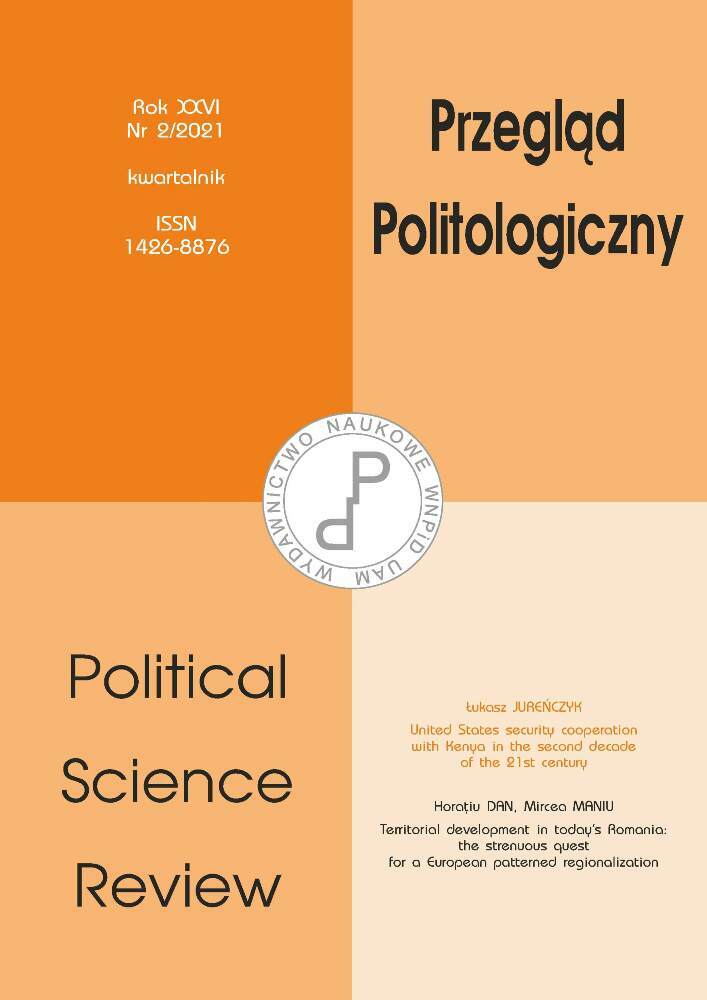Abstract
A common feature in the countries of Central and Eastern Europe (CEE) seems to be a fairly similar level of quality of democracy. The aim of the article is to analyze whether the CEE countries are in the proces of retreat from democracy and whether there are clear differences in the level of development of democracy between the old EU countries and other EU countries. The indicators of the quality of democracy in the groups of CEE, North, South and West countries were assessed. The analysis revealed, similarly to the previous research by Lithuanian political scientist Saulius Spurga, that there is no clear difference between the indicators of the CEE group and the group of Southern European countries (including Spain, Portugal, Greece). On the other hand, in the case of Scandinavian and Southern European countries, there are significant differences in the level of democracy indicators. The data clearly show a higher level of quality of democracy in the Nordic countries. This is confirmed by the results of democracy quality reports from 2006, 2008 and 2010. Based on the analysis performed, it can be concluded that the differences in the quality of democracy in the group of old EU Member States are greater than the differences between the CEE countries and the countries of Southern Europe.
References
Dahl R. (2012), Demokracja i jej krytycy, tłum. S. Amsterdamski, Warszawa.
Diamond L., Morlino L. (2004), The Quality of Democracy. an Overview, “Journal of Democracy”, nr 4.
Dzień wolności prasy: Gdzie na świecie jest najgorsza cenzura, Raport (2015), https://www.polityka.pl/tygodnikpolityka/swiat/1617931,1,dzien-wolnosci-prasy-gdzie-na-swiecie-jest-najgorsza-cenzura.read, 15.02.2021.
Economist Intelligence Unit, Report (2013), https://pl.wikipedia.org/wiki/Wska%C5%BAnik_demokracji.
Economist Intelligence Unit, Report (2019), https://www.in.gr/wp-content/uploads/2020/01/Democracy-Index-2019.pdfhttps://www.in.gr/wp-content/uploads/2020/01/Democracy-Index-2019.pdf, 15.02.2021.
Freedom in the World 2017. Report (2017) Populists and Autocrats: The Dual Threat to Global Democracy, https://freedomhouse.org/report/freedom-world/freedom-world-2017, 15.02.2021.
Freedom House. Report (2020), https://freedomhouse.org/countries/freedom-world/scores, 15.02.2021.
Gastil R. D. (1990), The Comparative Survey of Freedom: Experiences and Suggestions, „Studies in Comparative International Development”, vol. 25, nr 1.
How the Index is Compiled (2020), https://rsf.org/en/detailed-methodology, 15.02.2021.
Nacjonalizm w Europie. BBC prezentuje ranking (2019), https://www.dw.com/pl/nacjonalizm-w-europie-bbc-prezentuje-ranking/a-51271134, 15.02.2021.
Press Freedom Index 2020. Report (2020), https://rsf.org/en/ranking/2020.
Public opinion in the European Union 2019, Report (2019), https://ec.europa.eu/commfrontoffice/publicopinion/index.cfm/general/doChangeLocale/locale/EN/curEvent/WhatsNew.index/WhatsNew/index//, 15.02.2021.
Linz J. J., Stepan A. (1996), Problems of Democratic Transition and Consolidation – Southern europe, South america, and Post-Communist europe, The Johns Hopkins University Press, Baltimore–London.
Kapsa I., Musiał-Karg M. (2020), Alternatywne metody głosowania w opiniach Polaków. Postawy i poglądy względem wybranych form partycypacji w wyborach, UAM WNPiD, Poznań.
Schopfin G. (1994), Postcommunism: The Problems of Democratic Construction, Deda-lus 123 Nr 3.
Schumpeter J. A. (2009), Kapitalizm, socjalizm, demokracja, tłum. M. Rusiński, Warszawa 2009.
Spurga S. (2011), Pokomunizmas po dvidešimt metų: Šiaurės Europos valstybių, Pietų Europos valstybių ir Vidurio ir Rytų Europos valstybių demokratijos rodiklių palyginimas, „Politologija” nr 4.
Śliwiński M. (2005), Analiza porównawcza systemów politycznych. Drogi do współczesności, vol. 1, Drogi do współczesności, Wydawnictwo Uniwersytetu Warszawskiego, Warszawa.
Szewczyk W. (2010), Jak zmierzyć demokrację? Teoretyczne i metodologiczne podstawy budowy skal demokracji politycznej w politologii porównawczej, „Przegląd Politologiczny” nr 4.
World Press Freedom Index 2005 i 2010. Report (2010), https://rsf.org/en/world-press-freedom-index-2010, 15.02.2021.
Wyniki wyborów europejskich w 2019 r. Report (2019), https://www.europarl.europa.eu/election-results-2019/pl/frekwencja/, 15.02.2021.
